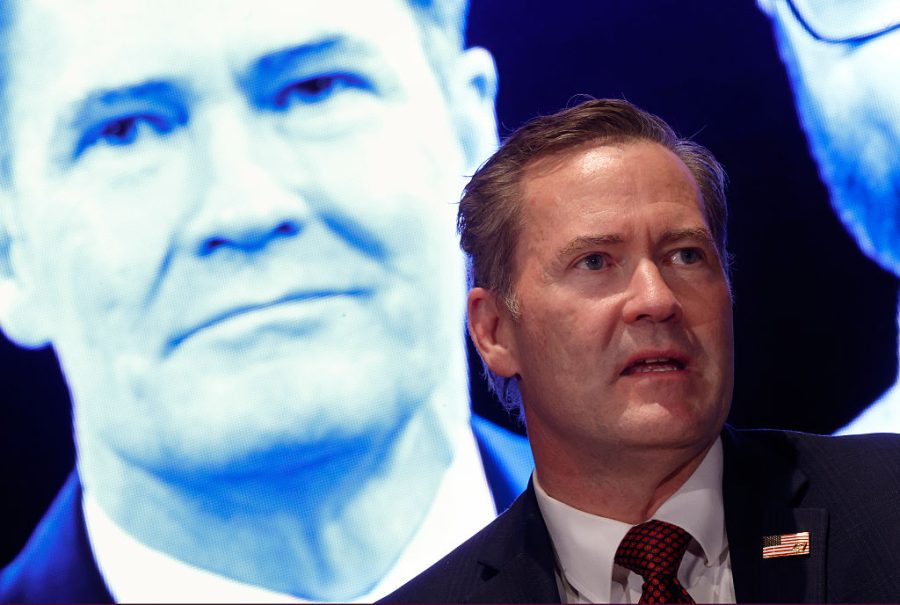Oh what a circus, oh what a show. It began on Thursday morning, with stories circulating that the US national security advisor, Michael Waltz, was about to be dropped. This seemed to be confirmed when President Trump spoke at an event for the National Day of Prayer, and reeled off praise for his top team, including Secretary of Defence Pete Hegseth and John Ratcliffe, the director of the CIA – but made no mention of Waltz.
Waltz’s departure had long been thought likely. While the most vainglorious and locker room chat-like braggadocio in the Signalgate scandal earlier this year had come from Hegseth and Vice President J.D. Vance, Waltz had set up the ‘Houthi PC small group’ chat. Trump had brushed off this breach of security, which would have seen any lower-ranking National Security Council (NSC) official escorted directly out of the Eisenhower Executive Office building, as ‘something that can happen’. But there were said to be undercurrents which were moving against him.
The UN is not the crucible in which America’s foreign policy is being made.
His relations with other senior officials were said to be fraught. One source said Waltz had fallen out with the White House chief of staff, Susie Wiles, because ‘he treated her like staff and didn’t realise he’s the staff, she’s the embodiment of the President’.
He was also struggling with appointments to the NSC, with his candidates for senior director roles on strategy, nuclear and strategic issues and African affairs rejected as too ‘establishment’. That sense of ineffectual leadership was compounded by the President’s dismissal of leading officials, including the director of the National Security Agency, General Timothy Haugh. Far-right activist and conspiracy theory enthusiast Laura Loomer was whispering in Trump’s ear like a cosmetically-enhanced Grima Wormtongue; the accusations against experienced, respected national security professionals were always the same: disloyalty to the President.
The day was not yet done. Early in the afternoon, on his Truth Social platform, Trump announced that he was nominating Waltz as United States permanent representative to the United Nations. He had withdrawn his first choice, Rep. Elise Stefanik, due to fears that her seat in the House of Representatives might fall to the Democrats if vacated.
‘Mike Waltz has worked hard to put our Nation’s Interests first,’ Trump proclaimed. ‘I know he will do the same in his new role. In the interim, Secretary of State Marco Rubio will serve as National Security Advisor, while continuing his strong leadership at the State Department. Together, we will continue to fight tirelessly to Make America, and the World, SAFE AGAIN.’
In case anyone imagined this was an intricately plotted series of events, State Department spokeswoman Tammy Bruce was asked about Waltz’s nomination during a press conference – and clearly knew nothing of it. ‘Well, there you go,’ she responded. ‘Fabulous… It is clear that I just heard this from you.’ It was indeed.
Where does this leave Waltz? One fact worth noting is that as permanent representative to the UN, he will require confirmation by the Senate; as national security advisor he did not. An elaborate theory circulating says that Trump has nominated him in the knowledge that he will likely not be confirmed, thereby allowing him to be eased out of the picture, but this seems implausible. Firstly, there are too many variables for the President’s fleeting and syncopated attention span to have devised. In any event, the Republicans enjoy a majority in the Senate, and Waltz retains more respect among legislators than many other Trump appointees.
Assuming Marco Rubio’s ‘interim’ stint as national security advisor does not become a Kissinger-style two years, most of the candidates so far suggested will be worse than Waltz. He is a decorated former Special Forces colonel who worked at the Pentagon and the White House before election to Congress, and served on the House Armed Services, Foreign Affairs and Intelligence Committees. Although he had made some inglorious compromises to join the administration, he initially retained enough realism and independence of mind to be distrusted by MAGA loyalists.
As America’s permanent representative to the UN, Waltz will follow in distinguished footsteps: Henry Cabot Lodge, George H.W. Bush, Richard Holbrooke, John Negroponte. He may possibly have cabinet rank, and as a hawk on Russia and China he may relish being toe-to-toe with the enemy at the Security Council. But the UN is a tired-looking talking shop, one which Trump dislikes and has described as an ‘underperformer’ and ‘not a friend of democracy’. It is not the crucible in which America’s foreign policy is being made.
In the wider sense, little will change. Most of the President’s officials are bit-part players at best, at the service of Trump’s instincts and prejudices. In Congress, Waltz took a tough line against Russia on Ukraine; by this week, he was parroting Kremlin talking points on Fox News. Policy in this administration comes from the top and criticism is not invited, so perhaps Waltz’s particular place in the seating plan is not of huge importance.








Comments